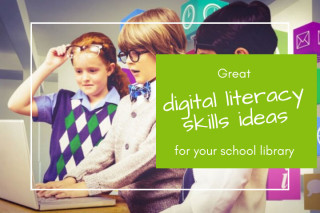- Your School Type
- Solutions
- Resources
- Blog
- Events
- More
- Contact Us
- Book a Demo
- Get a Quote

School libraries play an important role in equipping students with the digital literacy skills they need to effectively navigate the sea of information available online. However, when digital natives feel like they are already masters of the online search, how can teacher librarians tailor the curriculum to engage their students and achieve a positive outcome that extends beyond theoretical research? We’ve pulled together some ideas from around the world for you to draw on in your school library, as well as providing ideas about how Oliver v5 and LearnPath can support digital literacy in your school.

For adolescents, the Internet has become a primary source of answers to the health questions they feel embarrassed or scared to talk to their peers about. However, the misinformation on offer through Dr Google can contribute to dangerous student health outcomes.
In Assessing the Digital Health Literacy Skills of Tween Participants in a School-Library-Based After-School Program, the researchers developed a Digital Healthy Literacy Assessment Tool which uncovered that specific digital health literacy skills are needed to ensure students have the necessary skills to successfully find, assess, manage, and make use of health information online.
Evaluating Internet Health Information: A Tutorial from the National Library of Medicine
Online health information - what can you trust?
How to develop health literacy in the classroom

In the age of fake news and alternative facts, School libraries, political information and information literacy provision: findings from a Scottish study, looks at the role that school libraries can take in providing access to political information and skills on how to navigate the plethora of information generated by the 24 hour news cycle.
Fact checking and fake news lesson plans – The ultimate teacher guide
How to Spot Fake News - FactCheck.org

A 2016 study explored where people got their advice about online security, and how useful it actually was. Survey respondents who said they received their advice from teachers or librarians reported the lowest frequency of negative online experiences, reinforcing the importance of digital literacy skills programs in school libraries.
Office of the Children’s eSafety Commissioner - Classroom Resources
The National Library of New Zealand has published information on how school libraries can support students’ digital literacy. Core to their message is that school libraries need to provide easily accessible, quality, curated digital resources. They suggest that school’s should aim to provide 24/7 access to digital resources and that the integrated library system (such as Oliver v5), library blog or website, school learning management system, or curated content collections are ideal options.
LearnPath allows school libraries to:
Oliver v5 allows school libraries to:
• A new curriculum can be exciting, but overwhelming! We’ve added senior content in the LearnPath Community Content Hub (LCCH) to support you as you resource the curriculum. Here’s a snapshot of some available guides.
• In this video case study (5:40min), Jim Gallagher discusses his success using LearnPath guides as a teaching tool, and a number of other benefits of introducing LearnPath at his school.
• Did you know that Oliver isn’t just a Library Management System? You can use Oliver to keep track of resources throughout your entire school. Read this blog post to learn more.
• This blog post covers using Oliver to keep track of your school archival information.
Editor’s note: this post was originally published in May 2017 and was updated for freshness, relevance and accuracy in March 2020.